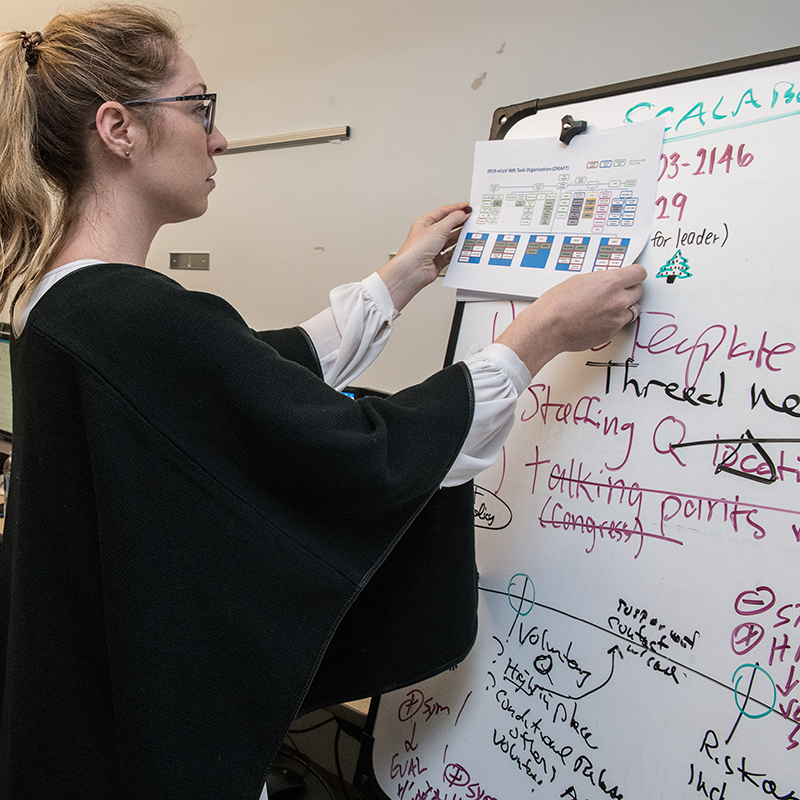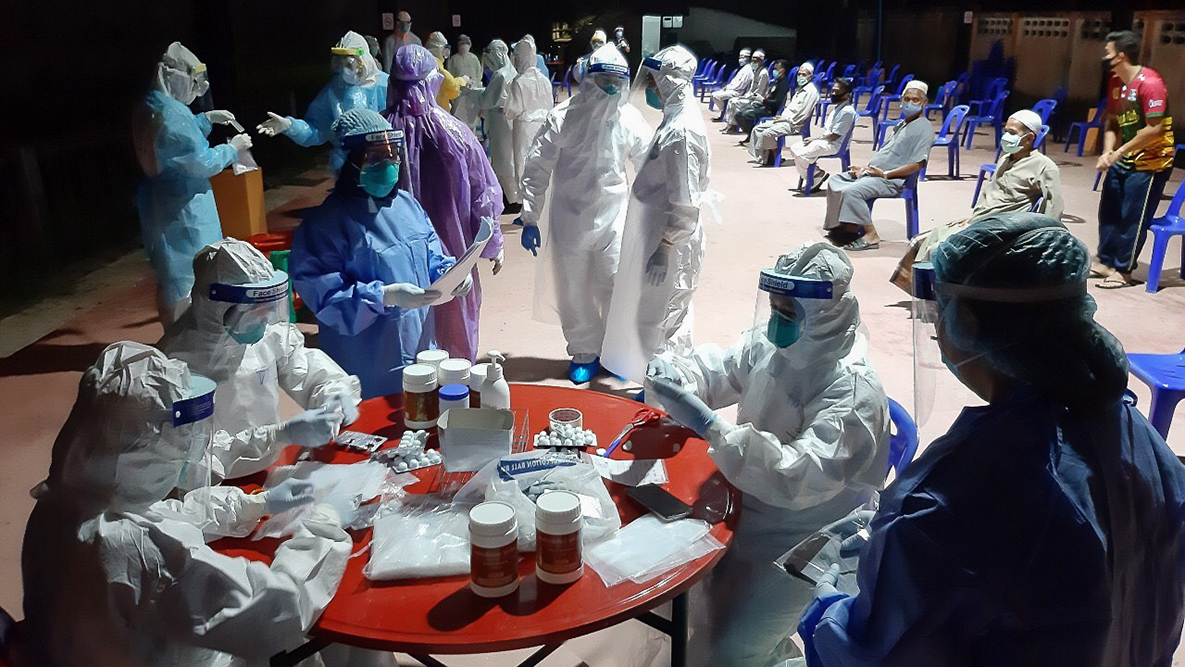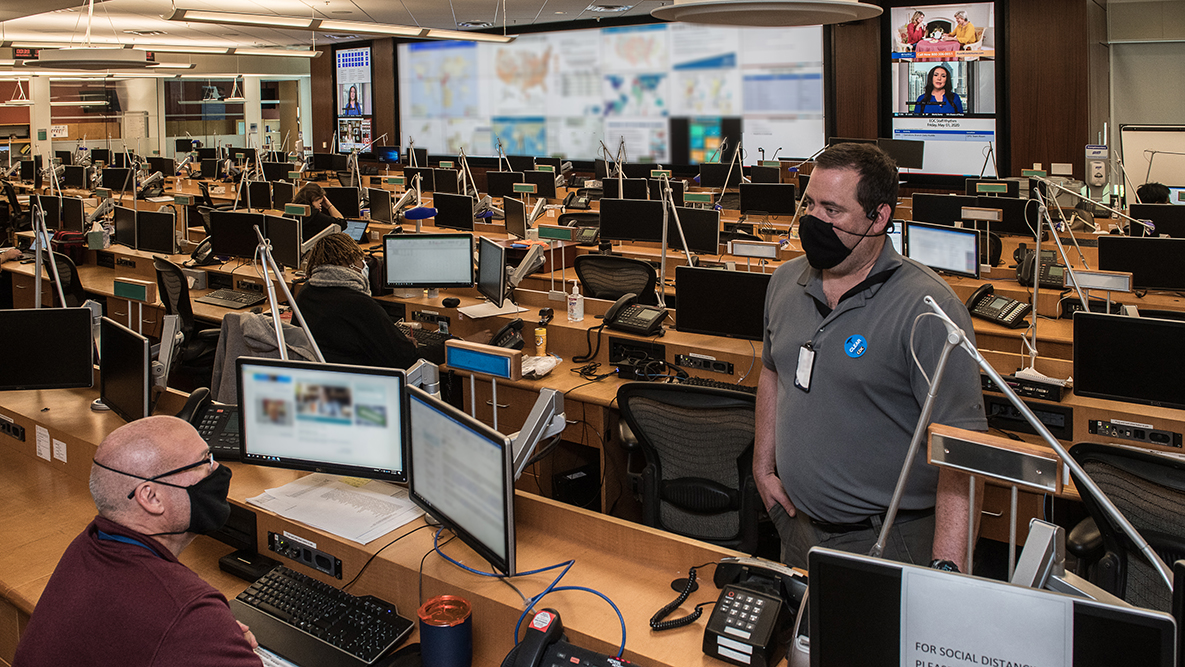CDC’s Global Response to COVID-19
Thanks to investments in global health security and decades of global cooperation to control diseases such as HIV, tuberculosis, malaria, polio, and influenza, CDC has built a strong foundation upon which to attack the coronavirus pandemic. Global health security means a country has a strong and resilient public health system that can prevent, detect, and respond to infectious disease threats wherever they occur in the world. CDC works 24/7 to protect the health, safety, and security of the American people and to fight global health threats worldwide, so we don’t have to fight them at home.
In today’s tightly connected world, a disease can be transported from any remote village to any major city on all continents in as little as 36 hours. COVID-19 has demonstrated that a disease threat anywhere is a disease threat everywhere.
CDC has a long history of improving public health capacity throughout the world to contain outbreaks at their source and minimize their impact. CDC partners with public health agencies, ministries of health, and multilateral and non-governmental organizations to support COVID-19 prevention, preparedness, and response efforts globally.
With this pandemic, CDC is seeing the benefits of its Field Epidemiology Training Program (FETP), which started 40 years ago. FETP has trained 18,000 field epidemiologists, or “disease detectives,” in more than 80 countries to help track, contain, and eliminate outbreaks at their source. CDC works closely with partner countries to establish FETPs around the world. Today, FETP graduates and current students all around the world are fighting COVID-19 as integral parts of their local public health workforces.

Centers for Disease Control and Prevention (CDC) activated its Emergency Operations Center (EOC) to coordinate with the World Health Organization (WHO), federal, state, and local public health partners, clinicians, and other partners in response to the coronavirus disease 2019 (COVID-19) outbreak. CDC is closely monitoring the situation and working 24/7 to provide updates. Photo by Jim Gathany.

Thai epidemiologists conduct active case investigations for COVID-19 during the Ramadan fasting period, resulting in the identification of more than 300 cases in the villages of Pattani, Yala, and Narathiwat Provinces from 17-18 April 2020. CDC established the first Field Epidemiology Training Program in Thailand in 1980 and continues to work with the Thailand Ministry of Health to train epidemiologists, also known as disease detectives, through FETP. Photo by Thailand Ministry of Public Health
The U.S. Congress allocates funds for CDC’s global response
So far, Congress has allocated $800 million to be used against COVID-19 globally. CDC is constantly monitoring the COVID-19 pandemic and directing resources based on changing epidemiology, response requirements, and opportunities to learn more about the virus. Examples of CDC COVID-19 response activities to date include:
- Training in infection prevention and control (IPC): In Vietnam, CDC is supporting training on IPC, including specimen collection and testing for laboratory and hospital staff at national hospitals and provincial hospitals in more than 30 provinces.
- Support response coordination: In Sierra Leone, CDC has supported adaptation of a system for electronic data capture in the field (case investigation, contact monitoring, etc.) and created virtual meeting rooms.
- Support epidemiologic response: In Zambia, CDC supported investigation and contact tracing for cases.
- Support for laboratory testing: In Malawi, CDC provided technical support for setting up a COVID-19 testing lab, helped to identify CDC-supported HIV labs for additional COVID-19 testing, and developed a three-day training course on biosafety standards.
CDC’s global activities are designed to build longer-term, sustainable capacity for any future outbreaks of highly communicable diseases. The goals of CDC’s global response to COVID-19 are to limit its spread, minimize the impact of COVID-19 in vulnerable countries with limited preparedness capacity, and reduce specific threats that pose current and future risk to the United States.

Outbreak response in action: Centers for Disease Control and Prevention (CDC) staff support the COVID-19 response in the CDC’s Emergency Operations Center (EOC) in Atlanta. Photo by Jim Gathany.
CDC’s technical support is delivered in coordination with the Department of State, the U.S. Agency for International Development (USAID), and other U.S. government agencies and stakeholders. CDC’s global COVID-19 response works toward these goals by meeting the following objectives:
- Strengthen other countries’ capacity to prevent, detect, and respond to local COVID-19 cases
- Mitigate COVID-19 transmission in the community, across borders, and in healthcare facilities
- Support governments, non-governmental organizations, and healthcare facilities to rapidly identify, triage, and diagnose potential cases to improve patient care and minimize disruptions to essential health services
- Address crucial unknowns regarding clinical severity, extent of transmission, and infection with support for special investigations and other forms of cooperation between CDC and country partners
- Ensure other countries’ readiness to implement vaccines and therapeutics when available
CDC and global partners are actively working to stop the spread of COVID-19 by detecting and confronting disease around the globe to increase our national security. To see the latest guidance and to learn more about keeping your community safe, visit CDC COVID-19. Also visit Global COVID-19 to explore available resources for our global partners.